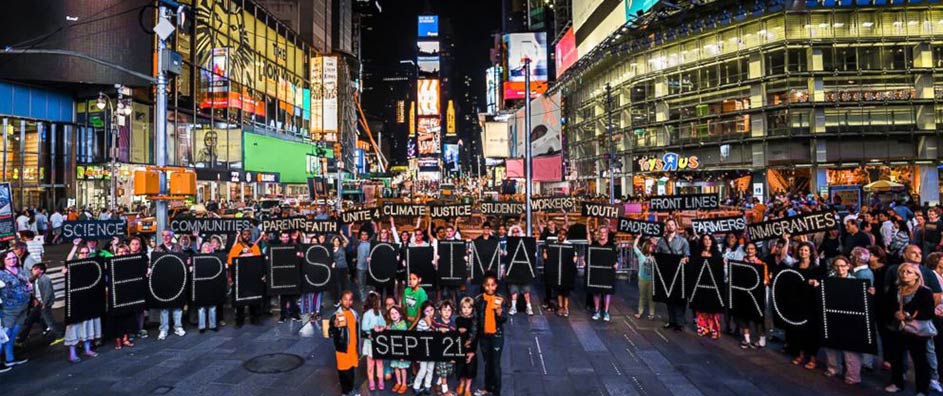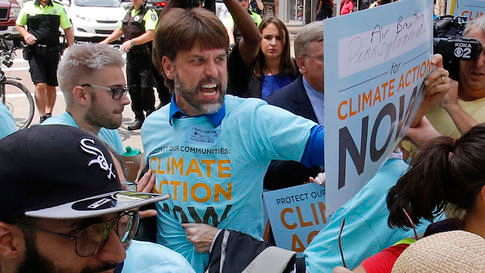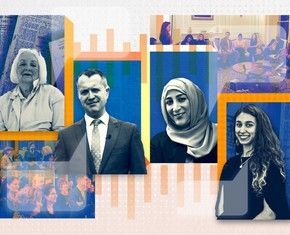The views expressed in our content reflect individual perspectives and do not represent the authoritative views of the Baha'i Faith.
We cannot segregate the human heart from the environment outside us and say that once one of these is reformed everything will be improved. Man is organic with the world. His inner life moulds the environment and is itself deeply affected by it. Shoghi Effendi, letter to a Baha’i, 17 February 1933.
This Sunday, September 21st, marks the UN’s celebration of International Peace Day—but it will also witness one of the largest mass protests on behalf of the environment the world has ever seen.
Timed to coincide with the beginning of a UN summit on the climate crisis, the People’s Climate March will flood the streets of Manhattan with many tens of thousands of environmental activists. They hope to alter the course of history by demanding the creation of a world safe from the ravages of climate change. On the same day, at least 2700 parallel marches in 158 countries will take place.
The march begins at 11:30 am, and its leaders will all come from the “front line” indigenous communities most affected by global warming—the island nations, rainforest tribes and others whose homes and livelihoods stand to suffer most. At 1 p.m., after a moment of silence, marchers will use musical instruments, cellphone alarms, whistles and their own voices to sound a climate change distress call for the planet, helped by at least 20 marching bands and the tolling of church bells across the city.
Many Baha’is plan to be there, alongside people of faith from a wide diversity of traditions, all calling on governments and corporations to come together to solve the world’s climate crisis.
But even after such a huge expenditure of time and energy, some people have asked, what can one march possibly do? Can it have any impact at all on the world’s seemingly endless appetite for fossil fuels, and do anything to reduce the carbon they emit? Isn’t the world now locked in to a hotter future anyway?
Let’s evaluate those questions.
Truthfully, no one march can ever accomplish much. But that’s not the point—repeated often enough, marches can help create and sustain larger movements. We know that movements for women’s rights and civil rights and human rights have accomplished a great deal, when they reflect and help generate overwhelming public will around serious issues. Also, one march, if it’s large and impactful enough, can help convince policymakers that they risk angering a large and growing subset of their constituency if they don’t take action.
Marches, demonstrations and non-violent protests have long served as unity-building instruments, too. They galvanize marchers, observers and especially those who haven’t yet made up their minds about the issue; and they help create a sense of hope for positive change.
As to the “impact” question, marches obviously can’t directly impact climate change or the world’s steadily-rising carbon load—but they do have a huge impact on public awareness. Media coverage can extend that awareness to most of the planet’s people. Ultimately, public awareness drives change more than any other external factor.
The world’s future well-being hinges on what humanity does in the immediate window of time directly in front of us. Yes, we’ve already exceeded all records for atmospheric greenhouse gases, and things will get hotter—the question is, how hot? If we slow the burning of fossil fuels now, dramatically ramp up the development of alternative energy, and mandate at least two-thirds of fossil fuels like coal and oil reserves stay in the ground, we can avert the looming disaster our children and grandchildren now face.
How can we accomplish those goals? The Baha’i teachings say that only one mechanism can overcome the power of multinational corporations to freely pollute the earth’s air and water, equitably regulate the use of the world’s natural resources, and bring us the stability, peace and environmental sustainability we so desperately need: world unity.
While it may still seem like a distant dream, we’re closer today than ever before in human history to a functioning, equitable and fair world government. We risk too much if we fail to quickly find common ground as citizens of the planet. This ticking time bomb of climate change demands global solutions—no nation or group of nations can possibly solve the problem by themselves. Together, though, we can ask our planet’s nations to embark on a unified and purposeful undertaking to help cure the dire illness that now afflicts our Earth:
The body of the human world is sick. Its remedy and healing will be the oneness of the kingdom of humanity. – Abdu’l-Baha, The Promulgation of Universal Peace, p. 18.

















Comments
Sign in or create an account
Continue with Googleor